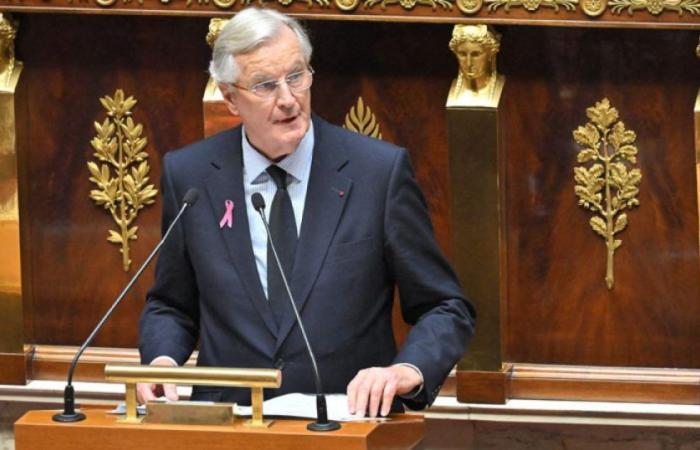
Appointed in September after 2 months without a government, Michel Barnier presented this Tuesday, October 1 from 3 p.m. the main points of the planned reforms. Taxes, education, security… Here is what should be remembered from his general policy speech.
Michel Barnier was expected at 3 p.m. for his general policy speech. “We are on a crest line”he declared in the preamble, Tuesday October 1.
“We must do well, and with little”he added shortly after, in reference to the large French public deficit, which should exceed 6% of GDP this year, i.e. “the second largest item of state expenditure behind schools”reminded the newly appointed Prime Minister.
Michel Barnier began by taking inventory of the state of public accounts, before launching into the statement of his government’s road map, which includes “five major projects”.
Reduce public spending
“The first cure for debt is reducing spending.” The Prime Minister has said that the new government’s priority will be to clean up public accounts by reducing spending. In 2025, “two thirds of the recovery effort” will come from reduced spending. Michel Barnier thus urged the deputies to “renounce magic money, the illusion of everything being free, the temptation to subsidize everything”arguing that this reduction in spending will be made “with communities, not against them or without them”.
The Prime Minister then attacked the effectiveness of public spending, which he believes must be systematically evaluated. “Is it normal that the cost of educating a French student is higher than that of our neighbors while our teachers are often paid less?”he asked: “Too often, our fellow citizens have the impression of not getting value for their taxes.” He thus promised to “to go hunting” fraud, duplication and other subsidies deemed ineffective.
“The third remedy is fiscal”
“Our taxes are among the highest in the world”recalled Michel Barnier, for whom “the situation of our accounts today requires a targeted effort, limited in time, shared, in a demand for tax justice”. He thus announced, as mentioned for several days, that large and very large companies, as well as “The most fortunate French people”will be used in a manner “exceptional”he assured.
The Prime Minister also reiterated his desire to fight against “tax and social fraud”particularly in “securing vital cards” with regard to the latter, for “avoid the undue payment of allowances”. “The 2025 finance bill (PLF) which is being prepared with extreme urgency takes into account this need to redress the accounts”he warned, calling on parliamentarians to debate and improve it.
“There is another sword of Damocles, that of ecological debt”
“We do not inherit the land from our ancestors, we borrow it from our children.” Michel Barnier addressed those for whom France cannot act alone against global warming. GHG emissions decreased by 3.6% in the first half of 2024, “proof that efforts are paying off”, according to the former European diplomat. He said he wanted to do “plus” pour “preserve biodiversity” and encourage the circular economy, in particular by strengthening France’s action within the European Union (EU).
“The ecological transition must be one of the drivers of our industrial policy: decarbonization of factories, encouragement of innovation, establishment of new transition industries, strengthening of our recycling sectors.” The Prime Minister spoke of a “ecology of solutions”while saying it is in favor of the continued development of nuclear power, particularly new reactors, while simultaneously investing in the renewable sector (wind turbines, biomass, biofuels for aviation).
For overseas territories, which have a target of 100% renewable energy, the Prime Minister called for the development of innovation laboratories in solar and geothermal energy.
At the national level, Michel Barnier affirmed his desire to continue the thermal renovation of buildings which, as a reminder, generates 23% of French annual GHG emissions. He also said he wanted “simplify” the energy performance diagnosis (DPE), in order to make it more readable and to reinforce the effectiveness of this policy.
Finally, to close the chapter on climate, the Prime Minister announced that he wanted to organize a “major national conference” on the question of water and the management of this resource.
“There is no fatality as long as there is no fatalism”
Michel Barnier wanted to show himself determined before the deputies, affirming that there is no “no fatality as long as there is no fatalism”. “Let us look clearly, the legislative elections resulted in an AN divided at the beginning of July as it has never been since 1958,” he noted, while recalling the absence of an absolute majority within the hemicycle. However, he considered that “the French would not forgive us for our inaction”thereby urging his political opponents to show good will.
The Prime Minister then continued to present the questions that will be at the heart of his mandate: “They are asking us for urgent answers to some big questions: rapid access to quality care close to home, how to live from work and retirement with dignity, how to improve public services, how to ensure security in my neighborhood or in my village.” To answer this, Michel Barnier pleaded for “respect and dialogue” between his government and parliament, and promised to rely more on the work of parliamentarians.
He advocated a reduction in the number of legal texts in order to give more time for their examination, and promised to“listen” a you “respect” towards all political sensibilities. And this, “even if this respect is not always reciprocal”he added. Finally, faced with an unprecedented political situation, the Prime Minister said he “ready” has “a reflection on proportional voting”a measure defended in particular by the MoDem.
A “renewal of social dialogue” on the subject of unemployment and pensions
Concerning the major reforms of Emmanuel Macron’s last governments, which were the scene of deep splits between unions and politicians, in particular the unemployment insurance reform and the 2023 pension reform, Michel Barnier assured that he wanted a “renewal of social dialogue”. He said he was ready to relaunch negotiations between the social partners “in the coming weeks on the employment of seniors and on our unemployment compensation system”.
On the subject of pensions, although he insisted on the need to maintain balance, the Prime Minister indicated that “certain limits of the law passed on April 15, 2023 can be corrected”.
Returning calm to overseas territories
Faced with the situation in New Caledonia for several months, as well as the current demonstrations against the high cost of living in Martinique, the new Prime Minister could not avoid the subject of overseas departments and territories.
More information to follow…





